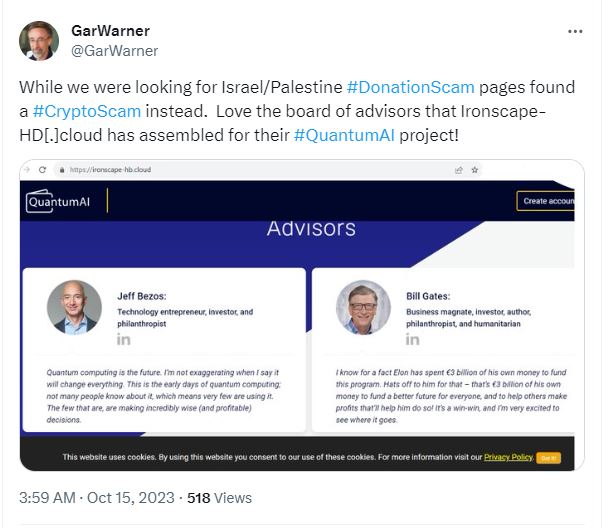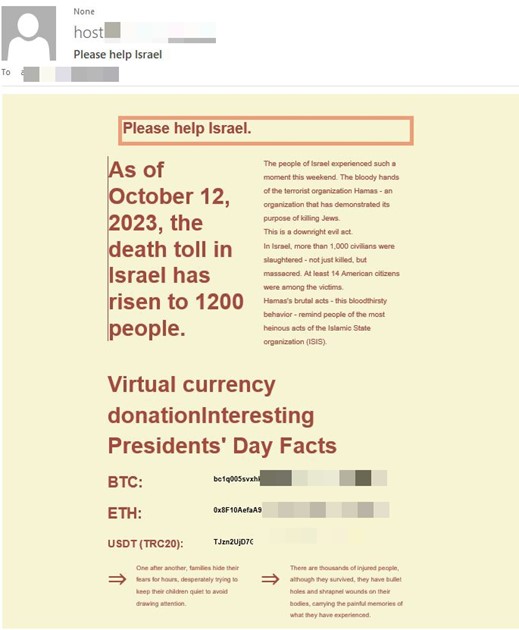
Scammers feel that the escalating conflict between Israel and militant Palestinian groups has spurred new scam opportunities for them. (Image by Shutterstock)
Cybercriminals using online scams to profit from Israel-Gaza conflict
- There has been an increased in online scams targeting donating funds to victims of the Israel-Gaza conflict
- Scammers send out emails requesting aid – then scam those who respond.
- Users need to be extra-vigilant in identifying such scams.
Online scams continue to be a global issue that governments and organizations are trying to tackle. Despite increased awareness and clamping down on the cybercriminals running these online scams, the number of victims continues to rise.
According to a report by Group-IB, in 2022, a total of US$55 billion was lost to online scamsacross the course of 2022. The report also stated that online scams continue to succeed, with a lack of awareness, prevention and prosecution worldwide also contributing to their growth.
Today, there are numerous types of online scams, from straightforward emails and social media scams to sophisticated scams that can wipe out the entire life savings of their victims. The most common online scams include romance scams, e-commerce scams, job scams and crypto scams.
Most victims who fall for such scams are those who do not practice good cybersecurity hygiene. That includes checking the validity of offers, promotions and competition wins. There are also those who are driven by the profits and monetary gains that are promised by signing up for scams online. This is most common in social media apps like TikTok and Facebook featuring cryptocurrency giveaways and payouts.
In the US, the FBI warned the public of a recent nationwide increase in “Phantom Hacker” scams, significantly impacting senior citizens. This Phantom Hacker scam is an evolution of more general tech support scams, layering imposter tech support, financial institutions, and government personas to enhance the trust victims place in the scammers and identify the most lucrative accounts to target.
Victims often suffer the loss of their entire banking, savings, retirement, or investment accounts under the guise of “protecting” their assets. Between January and June 2023, 19,000 complaints related to tech support scams were submitted to the FBI Internet Crime Complaint Center (IC3), with estimated victim losses of over US$542 million.

The tip of the iceberg that is online scams.
The rise in online scams from conflict and war
While cybercriminals are known to take sides during war and conflict, some choose instead to profit from the combination of chaos and compassion. For example, the conflict between Russia and Ukraine continues to see increasing cyberwarfare, with hackers from both sides targeting critical infrastructures.
More recently, the Israel-Gaza conflict has seen both parties being targeted by cyberattacks. According to reports, hacking groups with links to countries including Iran and Russia have launched a series of cyberattacks and online campaigns against Israel over the past week.
While these hackers and cybercriminals are part of the conflict, findings from Bitdefender show that there has been an increase in online scams. Bitdefender’s Antispam Lab started seeing email scam campaigns for disaster relief and help for refugees as cybercriminals use the catastrophic war in Israel and Gaza to benefit financially by exploiting the goodwill and charity of others.

An example of an email scam for the Israel-Palestine conflict. (Source – Bitdefender)
These scammers are aware of the conflict but are not really taking sides. Instead, these scammers feel that the escalating conflict between Israel and militant Palestinian groups has spurred new scam opportunities for them.
It’s not the politics. It’s not religion. It’s certainly not about any genuine human compassion.
It’s all about the money.
As such, cybercriminal groups have already begun targeting consumers’ inboxes with fraudulent correspondence. Many of the spam emails are directed toward inboxes in Russia, followed by Sweden, Romania, Iran and India, as well as the US, Japan, Germany and the UK.
The email scams resemble spam trends identified by Bitdefender researchers during the Ukraine war. These scams involve crypto donations and advance-fee schemes, exploiting the humanitarian crisis and targeting victims on both sides of the conflict.
Despite numerous victims and the genuine demand for aid, cybercriminals shamelessly persist in their spam attacks. They pose as both victims and fake charities, deceiving internet users to part with their money, thereby depriving those truly in need.
As the war enters its second week, Bitdefender anticipates these scam emails will regularly inundate inboxes worldwide. Fraudsters adapt their narratives and donation requests based on the latest news and updates about the conflict, ensuring a persistent threat to users.

Victims can easily fall for such scams – especially when prompted by compassion. (Source – Bitdefender)
Being alert is key
As always, being alert and informed is key to not falling for such scams online. No matter how genuine they may sound, there is no harm in cross-checking the information or doing some research before committing to such a cause.
Bitdefender urges people to stay informed and not fall for fraudulent correspondence they may receive during this time. The best way to remain safe and guard your finances is to closely inspect all war-related communications, whether via email, phone, text, or social media.
Cybercriminals have many ways to get at their victims. Even responding to such emails will only let them know that the email is valid. The scammers can then target victims with various other cons and malicious correspondence.
For individuals who wish to donate smartly and securely to the real victims of the war, Bitdefender recommends they research legitimate charity organizations that can provide help and emergency services to people.
READ MORE
- Safer Automation: How Sophic and Firmus Succeeded in Malaysia with MDEC’s Support
- Privilege granted, not gained: Intelligent authorization for enhanced infrastructure productivity
- Low-Code produces the Proof-of-Possibilities
- New Wearables Enable Staff to Work Faster and Safer
- Experts weigh in on Oracle’s departure from adland






